Star Trek: The Original Series - 148 - The Weight of Worlds Read online
Thank you for downloading this Pocket Books eBook.
* * *
Join our mailing list and get updates on new releases, deals, bonus content and other great books from Pocket Books and Simon & Schuster.
CLICK HERE TO SIGN UP
or visit us online to sign up at
eBookNews.SimonandSchuster.com
CONTENTS
Prologue
Chapter One
Chapter Two
Chapter Three
Chapter Four
Chapter Five
Chapter Six
Chapter Seven
Chapter Eight
Chapter Nine
Chapter Ten
Chapter Eleven
Chapter Twelve
Chapter Thirteen
Chapter Fourteen
Chapter Fifteen
Chapter Sixteen
Chapter Seventeen
Chapter Eighteen
Chapter Nineteen
Chapter Twenty
Chapter Twenty-One
Chapter Twenty-Two
Chapter Twenty-Three
Chapter Twenty-Four
Acknowledgments
About the Author
To Shore Leave, Norwescon, VikingCon, Lunacon, Philcon, and all the other fannish gatherings that have been my comfort zone for over thirty years now.
PROLOGUE
“Madam President! I need to talk to you about the latest allocations budget. The stellar evolution project cannot monopolize the subspace telescope like this. I need time on the apparatus for my own research!”
Doctor Elena Collins held up her hand to fend off the Tellarite’s blustering indignation. “Please, Mav. Not so early. At least let me enjoy my morning tea.”
A handsome woman in her early sixties, with long, snowy white hair, she was taking her usual post-breakfast constitutional around the campus. It was a cool, clear morning, approaching the planet’s vernal equinox, and the faintly violet sunlight showed off the Institute’s grounds and architecture to pleasing effect. Research centers, laboratories, libraries, galleries, an observatory, auditorium, and fully equipped gymnasium rose gracefully from the campus’s spacious lawns and courtyards, which were graced with outdoor art installations representing numerous cultures and traditions, both classical and cutting-edge. Even as she strolled down one of the tree-lined pathways winding through the campus, dogged by her irascible colleague, an amateur band was rehearsing on the east lawn. The group boasted a notably eclectic range of instruments, including everything from a Vulcan lyre to a bagpipe and bone flute, while their music sounded like a daring fusion of Klingon opera, Argellian belly-dancing rhythms, Denobulan show tunes, and old-fashioned Kentucky bluegrass. A holographic sculpture of Tarbolde’s Nightingale Woman danced atop a pedestal behind the musicians, moving in time to the melody. Sipping her tea, a citrusy blend she had discovered during her sabbatical on Tiburon a few years back, she paused to take in the familiar sights and sounds.
She felt very much at home.
The Ephrata Institute was an advanced academic think tank on the outer fringes of the Federation, attracting scholars from all over the quadrant who wished to pursue the life of the mind far from the distractions of civilization. After a somewhat peripatetic career, bouncing from one planet to another, Elena had finally put down roots when she agreed to take over as the Institute’s administrator. She had yet to regret that decision, despite the best efforts of prickly geniuses like Mav.
“But, Doctor Collins,” he persisted, “you must realize this is intolerable.” His porcine face was flushed with anger. Stubby claws waved a flashing data slate in her face. “Professor Kabrol has booked the subspace telescope for most of the next semester, leaving little time for the rest of us.” Steam jetted from his snout. “Typical Orion piracy, if you ask me. Pure, unadulterated brigandage.”
“Professor Mav!” Elena said sternly. She put on her most disapproving face, the one that had kept a couple of generations of unruly undergraduates in line. She had found it worked on misbehaving academics as well. “You know we do not tolerate such bigoted sentiments around here. That was unworthy of you . . . and the hallowed traditions of this institution.”
For over forty Standard years, the Institute had prided itself on its notably diverse population, which welcomed humanoid—and occasionally nonhumanoid—species from every sector of the quadrant. Just looking around her this morning, she could see humans, Andorians, Tellarites, Deltans, and other sentient life-forms going about their business in more or less perfect harmony. Indeed, Mav had clearly forgotten that Elena’s own partner, a distinguished poet, was one-quarter Orion, as evidenced by the subtle jade undertones of her complexion.
Thank providence that Yvete did not overhear Mav’s intemperate remark, Elena thought, or there would be hell to pay.
To his credit, Mav seemed suitably abashed by her reprimand.
“My sincere apologies,” he said gruffly. “I forgot myself. No slur was intended. I am simply passionate about my work, as you know, and can get incensed when I encounter obstacles to completing my research.”
“I quite understand,” she said, adopting a more conciliatory tone now that she had made her point. “Let us consider the matter forgotten.” She reached out and graciously accepted the data slate. “In the meantime, I promise to review the allocation requests and see what I can do to accommodate both you and Professor Kabrol. The universe is not going anywhere, as far as I know, so there should be time enough for both of you to study it—in your own fashions.”
Her assurances seemed to mollify the Tellarite cosmologist, at least for now.
“Thank you, Madam President. That’s all I was asking.”
Until next time, she thought, repressing a weary sigh. Riding herd on a whole passel of temperamental academics, artists, and scientists, all of whom believed that their latest project was the most important thing since Zefram Cochrane broke the warp barrier, could be a challenge, but she wouldn’t have it any other way. If nothing else, it made for a highly stimulating environment, albeit a sometimes exhausting one.
“Walk with me,” she suggested. “I’m curious to hear more about your recent investigations into cosmological anomalies.”
His face lit up, his previous bad humor swept away by her interest. He really was passionate about his work, as was everyone else at Ephrata. It was one of the things that made the Institute such a rewarding place to live and work.
“I would be honored, Madam President. You’ll be pleased to know that I am currently developing a revolutionary new theory about the possibility of fluidic space. Imagine that, if you will: an entire subdimensional continuum in which space consists of a liquid rather than a vacuum!”
“How fascinating. Tell me more.”
Collins sipped her tea and nodded as he lectured enthusiastically. They continued across the campus toward the observatory. Purple ivy and creepers adorned the steel, glass, and marble walls of the buildings around them. The Institute was nestled in a cozy valley between two gently rising hills. The bulk of the academic facilities were located in the valley, while faculty and visitor housing occupied the wooded slopes. Elena’s own home, which she shared with Yvete, was a cozy bungalow nestled between leafy trees that were already changing color with the season. Fallen leaves, blowing across the campus, crackled beneath her tread.
A bell chimed, tolling the hour. Elena recalled that she had a meeting with the head of the geology department after lunch. Something about launching another expedition to explore the planet’s inner core. There was even talk of a foreign exchange program with t
he Hortas on Janus IV. . . .
“Mind you, fluidic space is only a theory now, but it’s possible that we might be able to find evidence to support our conceptual models by taking readings from a very specific variety of quantum singularity, which is why is I urgently require more time on the subspace telescope—”
A sudden clap of thunder, coming out of nowhere, startled them both. The wind whipped up without warning, blowing Collins’s hair across her face. Tree branches rustled loudly. Fallen leaves skated through the air. The sky, which had been clear and lavender only moments before, was invaded by roiling burgundy clouds that billowed into being directly above the campus. Energy discharges flashed ominously within the rapidly burgeoning clouds. It was both spectacular and frightening.
“What the devil?” Collins whispered.
Gasps and exclamations, erupting all around her, indicated that she and Mav weren’t the only ones caught off guard by the unexpected turbulence. All eyes, antennae, and psychic receptors turned toward the seething atmospheric disturbances above. The pulsating clouds blotted out the sun, turning the day dim. The band put down their instruments, unable to compete with the brewing tempest. Mav sniffed the air. His nostrils flared.
“The wind,” he announced. “It smells . . . wrong.”
The president could smell it too. There was a distinct whiff of ozone in the air, indicative of some sort of ionization effect. Goosebumps broke out over her skin. Tiny hairs stood up along the back of her neck.
“What is this?” Mav asked. He nervously pawed at the ground with his heel, digging a short trench in the lawn. “Where did this come from?”
“I don’t know,” Collins said, equally baffled and concerned. This region of Ephrata IV was known for its mild and temperate climate. Elena had never witnessed weather like this in all the years she had resided on the planet. Certainly, Meteorology had not predicted any major storms in the offing. Unlike the more developed population centers at the heart of the Federation, Ephrata was not equipped with full climate-control stations. They had never seemed necessary before. . . .
Was this an emergency situation? She plucked a communicator from her belt. “Collins here,” she said crisply, raising her voice to be heard over the wind and shouting. “Get me Environmental Sciences!”
A burst of static greeted her hail.
“Hello?” she attempted. “Anybody?”
Angry pops and crackles assailed her ears. Scowling, she put down the communicator. Whatever this disturbance was, it was apparently interfering with their communications as well.
Terrific, she thought.
Plasma bolts, crackling with crimson energy, blasted down from the sky, striking the campus. A decorative fountain, of third-dynasty Elasian design, was blown apart by a blast, the sparkling liquid metal in its basin boiling over. Another bolt took out the corner of the Phlox Library. Flying rubble rained down on the campus. Smoke and flames added to the turbulent atmosphere. Startled gasps gave way to screams as men, women, neuters, and androgynes ran for cover. Pandemonium consumed the Institute.
“No,” Collins whispered, aghast. “This can’t be happening.”
A jagged energy bolt shattered the walkway in front of her, only a few meters away. Bits of powdered masonry pelted her face; the brightness of the discharge left spots before her eyes. The teacup slipped from her fingers, crashing unnoticed onto the paving stones. Her ears rang.
“My work!” Mav exclaimed. His piggish eyes bulged from their sockets as yet another bolt hit the main cosmology complex. A wall of ivy burst into flames. “I must save my work!”
Abandoning the president, he raced frantically toward the burning building. She reeled about, trying to figure out where she was needed most. Her eyes still watered from the plasma flash. The wind whipped her long hair about, further obscuring her vision. She angrily brushed it aside. The spreading smoke irritated her nose and throat. She coughed hoarsely.
I have to do something, she thought, but what?
As nearly as she could tell, the disturbances were zeroing in on the main square at the center of the Institute, which was attracting the bulk of the plasma strikes. The churning mass of clouds overhead also appeared to be converging on the center square. She heard screams and shouts from that direction. A chill ran down her spine as she remembered that Yvete typically conducted an outdoor poetry jam in the square every morning.
Yvete!
She raced across the campus, passing heart-breaking scenes of chaos and destruction along the way. Overwhelmed medics and security staff, who had never before coped with an emergency on this scale, hurried to the aid of the injured. Automated fire-suppression systems struggled to control the blazes. Directed force fields were employed to cut off the flames’ oxygen, but the fires were outracing the fields. Elena wished that she had scheduled more emergency drills.
But would that truly have made any difference? How on Earth—or Ephrata—could you prepare for something like this?
It was a nightmare.
By the time she arrived at Pearl Square, so called for the nacreous white tiles paving the large courtyard, all hell had broken loose. Scientists and scholars were pouring out of the endangered buildings, clutching data slates, microtapes, jars of biological specimens, irreplaceable archaeological artifacts, and even old-fashioned books and papers. A plasma bolt decapitated an imposing silicon statue of Richard Daystrom, as though outraged by that tormented genius’s tragic fall. Emergency sirens blared, adding to the cacophony. As if anyone couldn’t tell that there was a catastrophe under way!
And then the gravity went mad.
The weight of worlds crashed down on Elena, who suddenly felt as though she had just gained two hundred kilograms. Ephrata’s gravity, which was roughly ninety-seven percent Earth-normal, increased to near Jovian proportions, at least where she was standing. Her limbs felt like solid duranium; she could barely lift her feet. It took all her effort not to drop onto the tiles. All her blood seemed to rush to her feet. She felt dizzy and light-headed. Her lungs labored to breathe.
How—? I can’t . . .
The weight was unbearable, until, just as quickly as it had fallen upon her, the crushing gravity evaporated and she abruptly felt light as air. The abrupt transition turned her stomach. Her gorge rose, and she clenched her teeth to keep from vomiting.
What is this? Collins thought. The scientist in her desperately tried to make sense of what she was experiencing. Was this a freak natural phenomenon, or some sort of artificial gravity mishap? Had there been an accident at the applied physics lab? She wasn’t aware of any experiment that could have triggered a disaster like this, but maybe somebody had carelessly violated the safety protocols?
Heads would roll if that was the case, assuming the entire Institute wasn’t about to disappear into a wormhole or singularity. The natural laws governing mass and attraction were being rewritten all around her.
Glancing about in horror, she saw random gravity fluctuations wreaking havoc on people and property. The photonic arts gallery collapsed under its weight, sinking deep into the earth. A fleeing historian lost touch with the ground and, shrieking in terror, drifted off into the sky like a lost helium balloon. Elena watched him disappear into the violent plasma storm overhead. Blinding flashes threatened to incinerate him, if he didn’t achieve escape velocity first.
Nor was the unfortunate historian alone in his plight. Afflicted with negative gravity, various friends and colleagues became unmoored from the planet, along with random bits of debris and rubble, only to abruptly regain their weight at terminal heights. Dagmar Polasky, an award-winning geneticist and playwright, rose as high as the upper stories of Trang Hall before suddenly plummeting like a meteor back down onto the square. A smoking crater mercifully concealed her remains.
The shocking tragedy drove home the risk to those she loved.
“Yvete?”
Collins searched for her partner amid the tumult. At first she couldn’t find her, and for a few horrible mom
ents, she feared that Yvete had been lost to the sky like those others. Panicked colleagues, fleeing the devastation, bumped and jostled Elena, blocking her view of the square. She forced her way through the mob toward the formerly peaceful corner where Yvete typically held her poetry jams, in the shade of a levitating abstract sculpture. She shouted hoarsely, choking on the smoke and soot.
“Yvete! Yvete!”
Just when she had about given up hope, she spotted the precious poet lying prone on the tiles, seemingly pinned to the ground by an overdose of gravity. The mangled remains of the kinetic sculpture, which had once consisted of floating geometric shapes constantly reorganizing themselves into different configurations, lay in a heap nearby. It looked as though Yvete had gotten out from underneath it just in time. A lifeless tentacle, jutting out from beneath the wreckage, revealed that someone else had not been so lucky.
“Elena?”
Yvete struggled to lift her head from the tiles. Her speech was garbled, as though her tongue was weighed down as well. One arm appeared to be broken. But at least she was alive!
If only for the moment.
Letting out a sigh of relief, Elena started toward her, only to be stopped short by an urgent cry.
“Doctor Collins! Over here!”
She turned to see Officer Hevlas, the head of campus security, limping toward her. Soot covered the Andorian’s face, darkening his ordinarily pale blue features. His antennae were in a tizzy, unable to cope with the sensory overload. Turquoise blood leaked from a cut in his forehead. His usually immaculate tan uniform was torn and rumpled.
He looked just as shell-shocked as she felt. Hevlas had been in charge of security for at least a decade, she knew, and in that time he’d seldom had to deal with anything more serious than a few overenthusiastic celebrations or, at worse, a brawl between feuding academics or rival departments. He had once lost a tooth during a dust-up between the Preserver theory advocates and some hard-line Hodgkin’s Law devotees, but that was nothing compared to the carnage facing them now. His entire staff numbered fewer than a dozen.

 Q-Space
Q-Space Godzilla - the Official Movie Novelization
Godzilla - the Official Movie Novelization War for the Planet of the Apes: Official Movie Novelization
War for the Planet of the Apes: Official Movie Novelization Underworld: Evolution
Underworld: Evolution Underworld
Underworld Rise of the Lycans
Rise of the Lycans 04 - Rise of the Lycans
04 - Rise of the Lycans X-Men and the Avengers: Search and Rescue
X-Men and the Avengers: Search and Rescue Child of Two Worlds
Child of Two Worlds Welcome to Promise City
Welcome to Promise City The Librarians and the Mother Goose Chase
The Librarians and the Mother Goose Chase Dragon's Honor
Dragon's Honor 03 - Evolution
03 - Evolution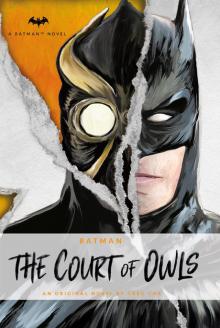 DC Comics novels--Batman
DC Comics novels--Batman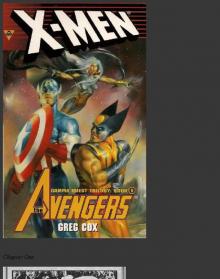 X-Men and the Avengers: Lost and Found
X-Men and the Avengers: Lost and Found Foul Deeds Will Rise
Foul Deeds Will Rise 02 - Blood Enemy
02 - Blood Enemy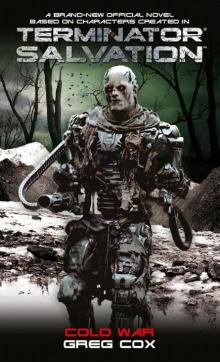 Terminator Salvation: Cold War
Terminator Salvation: Cold War The Weight of Worlds
The Weight of Worlds The Antares Maelstrom
The Antares Maelstrom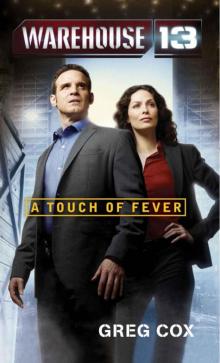 Warehouse 13: A Touch of Fever
Warehouse 13: A Touch of Fever Underworld: Blood Enemy
Underworld: Blood Enemy The Rise and Fall of Khan Noonien Singh
The Rise and Fall of Khan Noonien Singh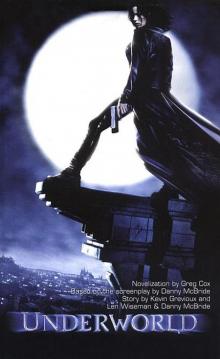 01 - Underworld
01 - Underworld The 4400- the Vesuvius Prophecy
The 4400- the Vesuvius Prophecy Assignment: Eternity
Assignment: Eternity The Eugenics Wars, Vol. 2: The Rise and Fall of Khan Noonien Singh
The Eugenics Wars, Vol. 2: The Rise and Fall of Khan Noonien Singh The Dark Knight Rises: The Official Novelization
The Dark Knight Rises: The Official Novelization The Bestseller Job
The Bestseller Job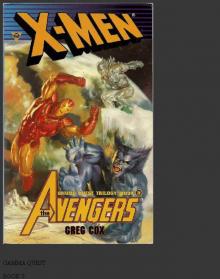 X-Men and the Avengers: Friend or Foe?
X-Men and the Avengers: Friend or Foe?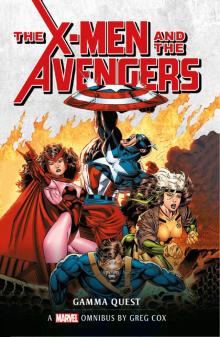 Marvel Classic Novels--X-Men and the Avengers
Marvel Classic Novels--X-Men and the Avengers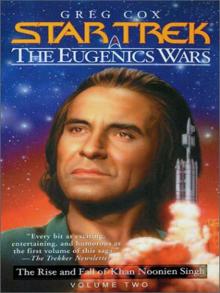 STAR TREK: TOS - The Eugenics Wars, Volume Two
STAR TREK: TOS - The Eugenics Wars, Volume Two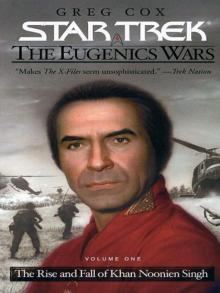 STAR TREK: TOS - The Eugenics Wars, Volume One
STAR TREK: TOS - The Eugenics Wars, Volume One The Black Shore
The Black Shore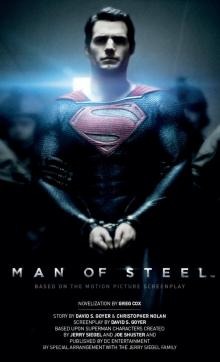 Man of Steel: The Official Movie Novelization
Man of Steel: The Official Movie Novelization Loose ends r-1
Loose ends r-1 Legacies
Legacies The Eugenics Wars, Volume Two
The Eugenics Wars, Volume Two Star Trek: The Original Series - 148 - The Weight of Worlds
Star Trek: The Original Series - 148 - The Weight of Worlds Star Trek: The Original Series: The Rings of Time
Star Trek: The Original Series: The Rings of Time Godzilla--The Official Movie Novelization
Godzilla--The Official Movie Novelization Star Trek: The Original Series - 160 - Foul Deeds Will Rise
Star Trek: The Original Series - 160 - Foul Deeds Will Rise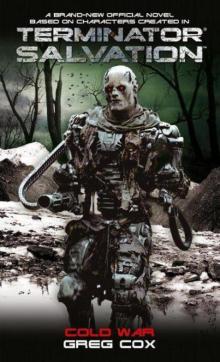 Terminator Salvation: Cold War ts-3
Terminator Salvation: Cold War ts-3 Star Trek: The Original Series: Miasma
Star Trek: The Original Series: Miasma Star Trek: The Original Series: No Time Like the Past
Star Trek: The Original Series: No Time Like the Past Child of Two Worlds (Star Trek: The Original Series)
Child of Two Worlds (Star Trek: The Original Series) THE 4400® WELCOME TO PROMISE CITY
THE 4400® WELCOME TO PROMISE CITY Star Trek: The Original Series: The Rings of Time (star trek: the original series)
Star Trek: The Original Series: The Rings of Time (star trek: the original series) To Reign in Hell: The Exile of Khan Noonien Singh
To Reign in Hell: The Exile of Khan Noonien Singh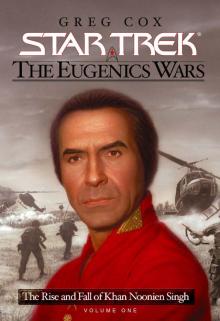 Star Trek: The Eugenics War, Vol. 1
Star Trek: The Eugenics War, Vol. 1 The Q Continuum
The Q Continuum